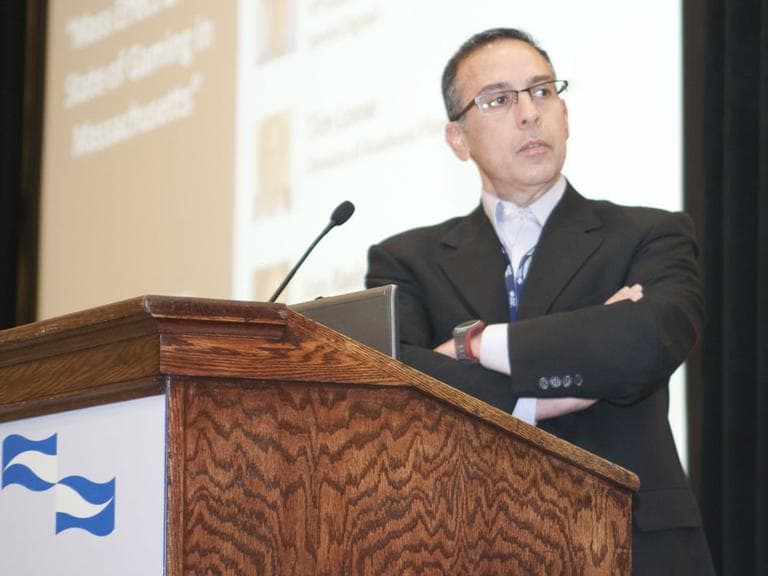Advertisement
Mass. Game Industry Struggles Ahead Of PAX East
Resume
Video games aren't just fun and games in Massachusetts; they are a very serious, $2 billion a year business, spurred largely by the game development talent pouring out of MIT.
That's partly why, for the second year in a row, the Seattle-based Penny Arcade Expo (PAX) has chosen Boston as the site of their East Coast convention. Sixty-thousand people are expected at the Boston Convention and Exposition Center for PAX East this weekend.
Landing PAX East for the first time last year was considered a major coup for the local game developer community, which has long stood in the shadow of the West Coast's. Massachusetts, it seemed, had arrived.
But now, it seems as though the local industry is stumbling, rather than sprinting into this year's PAX.
The Year The Music Game Died
For the second year in a row, the night before PAX East was lit up by a special party and expo just for Massachusetts-based game developers at the Microsoft NERD Center in Kendall Square. Basically, it's a bunch of MIT kids showing their game concepts and fishing for investors.
One exhibitor I met there Thursday night didn't go to MIT. His name is Eliot Hunt, and he went to Berklee.
"We're building a web-based platform that allows musicians to showcase their talent on the Internet," said Hunt as he stood proudly next to his booth.
Hunt is with a little Boston company called Big Life Labs. Their concept is basically like Guitar Hero, where you play guitar with a virtual band and a virtual audience, except here, you play on a real instrument instead of a little plastic controller.

Hunt shoved a guitar into my hands and I fumbled ineptly over "Get Back," by The Beatles. But the virtual crowd on the screen seemed to love it.
"All of the avatars that are in the world are other listeners that are logged in," Hunt explained. "They could be in Japan, could be in Canada, and they vote on what they're hearing."
I certainly had fun playing Hunt's game, but this was the year the music game died.
"Guitar Hero" was discontinued, and Harmonix, the Cambridge-based developer of "Rock Band," posted nine-figure losses. Viacom sold them off, and the company laid-off dozens of employees, traumatizing the local game developer scene.
Hunt is worried that could rub off on his product as he shops it around to investors.
"Hopefully we can convince them the slant we're putting on this is a bit more exciting and is sort of the next evolution of these games," Hunt said.
For the local game industry, these hard times for Harmonix have represented injury after insult, the latter having been dealt by former Red Sox pitcher Curt Schilling. Schilling moved his game company, 38 Studios, to Rhode Island after Massachusetts didn't come through on a tax break he wanted.
Critics called Schilling greedy, but he's not the only gaming entrepreneur around here who's felt spurned by the Commonwealth.
The California Gold Rush
"Who in this room is planning to start a game company, of any kind?" asked longtime Massachusetts gaming magnate Jon Radoff, founder of GamerDNA and the new Facebook game "Disrupter Beam." His audience, at the MIT Sloan School of Management's Business in Gaming conference Thursday, shot up about half a dozen hands.
"Ok. And of you, are you gonna definitely do it in Massachusetts?" Radoff asked.
A lot of heads shook in the affirmative.
"Like, I don't know why you would do that," Radoff said to stunned silence.
"If I was starting a company today, and I was like fresh out of MIT Sloan with nothing kind of rooting me to the area, there's not a lot of obvious reasons why you would actually start a game company in Massachusetts," Radoff said. "You would be better off going to California."
California is just the biggest of 21 states that now offer some kind of tax incentive for game developers.
Here in Massachusetts, there was talk last year of extending the state's film tax credit to the gaming industry. When I visited the first PAX East back then, all of the developers seemed certain that would happen. But it didn't, and the film tax credit itself came into question on Beacon Hill.
Now in recent weeks, Worcester state Rep. Vincent Pedone has introduced new tax credit legislation. In the current budget environment its future is uncertain, particularly in the face of arguments like this one, posed at that Sloan panel by moderator Mike Cavaretta:
"Look how far the state's game industry has come without any kind of help. Why do we even need anything? Anybody have a rebuttal to that?"
"I'll jump in," said Gordon Bellamy, chair of the International Game Developers Association. "Because you will lose, that's why. You know, people have all sorts of offerings, whether it be lower prices, better taxes..."
And a better regulatory environment. For example, the game industry is powered in large measure by independent contractors. In Massachusetts, it can be hard to hire a contractor for your core business functions without treating him or her as a full employee and offering benefits. That's meant to protect workers from exploitation, but the game industry has been clamoring to get that law changed for years.
And this year, there's a bill in the legislature to do just that.
"Even with these public policy changes coming into play, I don't think the financing environment [in Massachusetts] is gonna change short of a decade," said Radoff. Not because the economy is bad, but because years of unfriendly public policy may have put Massachusetts permanently behind California.
Even if Beacon Hill starts handing out goodies to the industry now, it may be too late, according to Radoff.
"It's the lack of a really substantive publisher presence in the state in the game industry, it's the lack of a lot of rich angel investors who have made millions in the game industry who want to directly invest in the new wave of companies. That really doesn't exist here," Radoff said.
The Future Is Mobile
On the upside, what does exist here is plenty of guys like Christian Baekkelund, another MIT grad whose company, Subatomic Studios, was showing off their new iPad game Thursday. It's called TinkerBox.
"It's basically a 3-D physics puzzle game," Baekkelund explained as he dragged various gizmos around to guide a stream of digital ball-bearings into a pocket.
The popularity of blissfully simple apps like this one led industry observers to christen 2010 "the year of the mobile game." That's a wave that Baekkelund says Massachusetts can ride, with its preponderance of small firms and cash-poor but skill-rich students.
"With a lot of the mobile platforms, it's pretty quick to get something up and going pretty easily," Baekkelund explained. "So, definitely for a lot of the smaller companies, especially the newer start-ups, it's very easy to get something going right away."
But at 99 cents a pop on iTunes for that kind of thing, it could take a long time for small and mobile Massachusetts to balance the scales with the Golden State.
This segment aired on March 11, 2011.